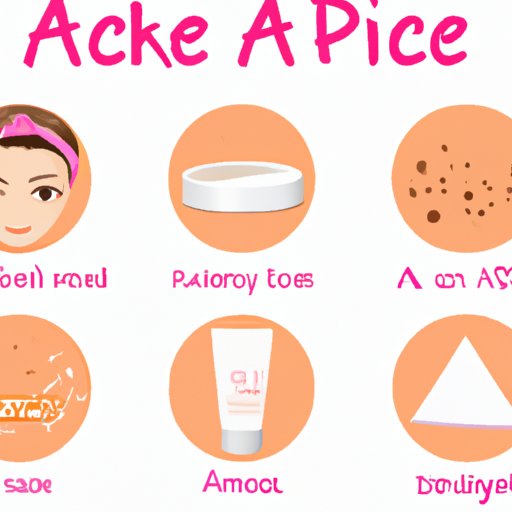Introduction
Makeup is a popular way for people to enhance their natural beauty, but does it come with a hidden cost? Many people worry that makeup might be causing their acne, but is this actually true? In this article, we explore the potential link between makeup and acne, looking at the ingredients in makeup, their effects on skin health, and different types of makeup. We also examine other potential causes of acne and the benefits of using makeup to cover acne.
Analyzing the Ingredients of Makeup and Their Impact on Acne
Makeup products are made up of a range of different ingredients, some of which may have an impact on skin health. Common makeup ingredients include emollients, preservatives, fragrances, and colorants. Emollients help to soften and moisturize the skin, while preservatives help to prevent bacterial growth. Fragrances can help to make the product smell nice, but they can also cause irritation or allergic reactions in some people. Colorants are used to give makeup its color, but some may be comedogenic (pore-clogging).
The potential effects of makeup on skin health depend on the individual ingredients and how they interact with each other. For example, if a product contains a comedogenic ingredient, it could potentially clog pores and lead to breakouts. Similarly, if a product contains an irritant, it could cause inflammation, dryness, and redness.
Different types of makeup may have different effects on skin health. Heavy, long-wearing formulas are more likely to clog pores than lighter, water-based formulas. Similarly, makeup containing oil-based ingredients is more likely to cause breakouts than oil-free formulas. In general, it’s best to opt for lightweight, oil-free formulas that won’t clog pores.
Exploring the Relationship Between Makeup and Acne
While there is no definitive answer as to whether makeup causes acne, there are a few reasons why it might be contributing to breakouts. Firstly, makeup can clog pores if it contains comedogenic ingredients or is applied too heavily. Secondly, makeup can cause irritation if it contains fragrances or other irritants. Finally, makeup can trap oil and bacteria on the skin, leading to breakouts.
If you’re concerned about the possibility of makeup causing acne, there are a few steps you can take to minimize the risk. Firstly, make sure to use oil-free, non-comedogenic makeup formulas that won’t clog your pores. Secondly, don’t forget to cleanse your skin thoroughly after removing your makeup. Finally, opt for mineral-based makeup formulas, which are less likely to cause irritation.

Investigating the Causes of Acne Beyond Makeup
Makeup isn’t the only potential cause of acne. Other factors such as hormones, stress, diet, and genetics can all play a role in the development of acne. To reduce the risk of breakouts, it’s important to adopt healthy habits such as eating a balanced diet, exercising regularly, and managing stress levels.
It’s also important to keep in mind that everyone’s skin is different, so what works for one person may not work for another. If you’re struggling to figure out what’s causing your breakouts, it’s best to consult a dermatologist who can offer personalized advice.

Examining the Benefits of Using Makeup to Cover Acne
While makeup can potentially contribute to breakouts, it can also be beneficial for people with acne. Makeup can be used to cover up blemishes and redness, making skin look smoother and more even. However, it’s important to choose the right makeup for your skin type. For example, people with oily skin should opt for oil-free, non-comedogenic formulas, while those with dry skin should look for hydrating formulas.
When applying makeup, it’s important to start with a clean, moisturized face. Use a gentle cleanser and apply a light layer of moisturizer before applying any makeup. This will help to keep your skin hydrated and reduce the risk of irritation. When applying makeup, use a light hand and blend well to avoid caking and creasing.

Reviewing the Latest Research on the Link Between Makeup and Acne
Recent research has looked into the potential link between makeup and acne. While some studies have found a possible connection, others have found no association. It’s important to remember that research in this area is still in its early stages and more studies are needed to draw definitive conclusions.
It’s also important to note that current research has a number of limitations. For example, most studies have been conducted on small sample sizes, which limits their generalizability. Additionally, many studies have relied on self-reported data, which may be biased. As such, more research is needed to better understand the link between makeup and acne.
Conclusion
In conclusion, there is no definitive answer as to whether makeup causes acne. While some research suggests a possible link, more studies are needed to draw conclusive findings. That said, there are a few steps you can take to minimize the risk of makeup causing breakouts, such as choosing oil-free, non-comedogenic formulas and cleansing your face thoroughly after removing your makeup. Additionally, adopting healthy habits such as eating a balanced diet, exercising regularly, and managing stress levels can help to reduce the risk of breakouts.


